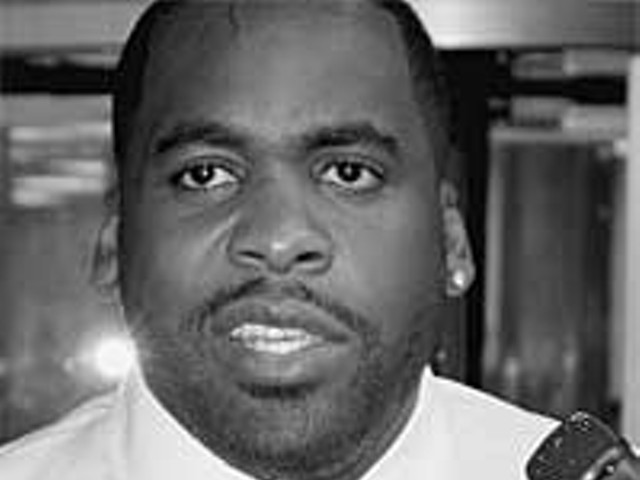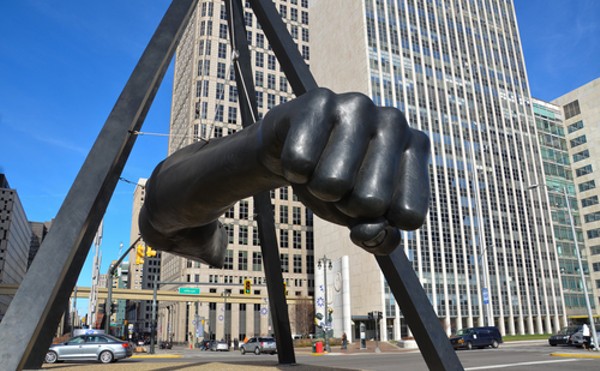“What Detroit needs to do is become more responsive to the population that lives here, so that we can believe in our city again. If we believe in our city, others will too, believe it, and we won’t have to beg you to come to it.” —Raymond T. Jackson
Two weeks ago I wrote a tough-talking column about the condition of the city, using Kay Everett’s death as a backdrop. I said, “The city is in terrible shape and getting worse,” that the schools are failing, and that we all need to face this.
The letters, as expected, came in torrents, many following a predictable pattern. Angry city residents lashed out at me for what they saw as trashing their city, and some absurdly claimed everything is fine. Smug suburbanites, who evidently missed the part where I called them morons for thinking they can live without the city, wrote to congratulate me on criticizing Detroit, and happily trashed the minorities who run it.
What was gratifying, however, is that so many city residents “got it,” and wrote or called me and said they knew exactly what I meant. Yet, of all the letters, the most interesting is the one I have quoted above, written by a man who didn’t leave me a number or any way to contact him. For all I know, that may not be Raymond T. Jackson’s real name. But his bitterness and anger are real.
Much of it, in fact, is seemingly directed at me, whom he calls a “pimpleheaded nogooder,” which makes me wonder if he somehow knows my friends. I also get called a dumbass, am accused of supporting the city’s current political system, and he signs off with a bitterly nasty “go fuck yourself.”
Yet his letter fascinated me because it’s clear that he isn’t really angry at me at all, but is instead raging at the condition of the city, using me as a convenient punching bag because he doesn’t know who he should really attack.
Jackson, who implies he is black and lives in Detroit, may not have a college education, but is clearly intelligent, a decent writer, and better at spelling and grammar than most of my students.
On one subject, he’s dead wrong — he claims that the city is thriving economically. Perhaps by comparison to Haiti, but not otherwise.
“Your argument that we need more white dollars is bullshit,” he rails. Well, I didn’t exactly say that. The city does need more dollars, which are generally green. Whites in the suburbs have more of them, even if that isn’t fair.
When it comes to understanding Detroit’s institutions, he’s much more perceptive. He tacitly accepts my criticism of Kay Everett, but adds angrily, “yet you don’t mention the political structure that allows her, and people like her to wind up on the City Council and thrive, while they muck up the city’s business.”
What Raymond Jackson doesn’t realize is that I totally agree with him about this, and have written so several times in this column (though admittedly not recently). Having an entirely at-large council is a prescription for an ineffective, unresponsive body. Yet that’s what we have, and most of them seem to like it, their salaries and their perks just fine.
With some justice, Jackson attacks the media for paying too much attention to the city’s political buffoons, “because that and only that is what keeps them in office, your naming them and haranguing them so their names will be remembered. If you had any integrity, you would report that their seemingly perpetual terms are the result of Detroit having an at-large council system that allows people to be elected with absolutely no accountability,” he fumes.
He’s dead right. Every four years, Detroit elects a slate of nine council members. Voters can’t possibly be expected to study dozens of candidates, so many plunk for names they know. That’s why a creature named Lonnie Bates, famous only for embarrassing humanity, is there, as are two people named Cockrel who loathe each other, but who share a famous dead man’s name.
Once elected, no council member is responsible to anyone except the whole city, which practically means they aren’t held accountable at all. What if you’re on council and want to ignore some poor little guy on the East Side with a problem? Chances are it won’t cost you much politically. Helping him might not do too much for you either. Plus, the charter says department heads don’t have to listen to you anyway. So better to make lots of noise, and get on camera.
Mayors like this system because it means council is inherently weak, and since no o ne represents any constituency, most are relatively easy to buy off.
That needs to be changed. I would prefer four at-large council members and five who represent geographic districts. But any change is going to require changing the city’s charter, and none on the present council wants to do that.
After all, as Jackson observes, they have secure if essentially ineffectual jobs. He closes by telling me, “What we need is a council that is elected by the neighborhoods and is not the product of a decrepit political ‘system,’” before suggesting angrily I do something that is, alas, anatomically impossible.
Well, whoever he is, he’s right, though he’s wrong in thinking I favor the present flawed system. So, Mr. Jackson: Why don’t you and your friends lead an effort to get the city charter changed? You won’t get much help from city hall, but that doesn’t mean you can’t make it happen or get it done.
We are also facing perhaps the city’s most crucial mayoral race ever next year. The field is already clear, so here’s your first glance at the racing form:
Mayor Kwame Kilpatrick, 34, is the odds-on favorite to win. Despite what often seems like appalling adolescent judgment and behavior, he remains widely popular and charismatic. He also has a war chest of perhaps $3 million.
Sharon McPhail, 56, is most likely to be the other candidate to survive the primary. She’s highly intelligent, experienced, stirs the heartstrings of voters and is as well-known as the mayor. She also promises to make Benny Napoleon, the popular former police chief, her deputy mayor. But critics say she has two standards — one for herself, another for everyone else.
Freman Hendrix, 54, was Dennis Archer’s deputy mayor and go-to guy. He has a lifetime of political experience in the city and county, and in some circles is regarded as the candidate for responsible and rational grown-ups. But he lacks money and widespread name recognition, and some who do know him blame him for things they didn’t like in the Age of Archer.
We’ll get to know all three a lot better throughout the year.
Why, by the way, do I say this may be the most important mayoral election ever? Because it may be the last for a long time that means something. Listen up, comrades: The financial situation in Detroit and with its public schools system is far worse than commonly known. Odds are that the state, sooner rather than later, will eventually have to take over and run the schools. Detroiters will hate that, though it may actually make things better for the kids.
Nor is that all. We’re approaching the day when the state may have to take over Detroit itself, as it has Highland Park and Hamtramck. The deficits are mounting, the ability to pay for them vanishing, and within a few years I can see the Legislature appointing a special master to run the city.
Matter of fact, unless some form of metropolitan government or at least close cooperation evolves, I think that is inevitable, and won’t that be peachy for all concerned? We still have a choice, but time is running out.
Cheers, everyone.
Jack Lessenberry opines weekly for Metro Times. Send comments to [email protected]




